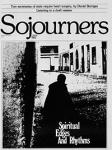Unless the Lord builds the house, those who build it labor in vain.
Unless the Lord watches over the city, the watchman stays awake in vain.
It is in vain that you rise up early
and go late to rest, eating the bread of anxious toil;
for he gives to his beloved sleep
(Psalm 127:1,2).
Abide in me, and I in you.
As the branch cannot bear fruit by itself,
unless it abides in the vine, neither can you, unless you abide in me.
...for apart from me, you can do nothing (John 15:4,5).
It was after midnight at the end of another long, busy day, and I had an early breakfast meeting the next morning. I decided to read a psalm before I turned off the light and, with no particular rhyme or reason, settled on Psalm 127. Although I have read this psalm before, I was completely unprepared for the shock it gave me that night.
Verse two caught me completely off guard: "It is in vain that you rise up early and go late to rest, eating the bread of anxious toil." I was struck right between the eyes. There could not have been a more vivid and disturbingly apt description of my life and the lives of most people I know here at Sojourners and elsewhere.
Busyness has become a way of life for many of us, even a status symbol. Our work is justified only if we are continually active and preoccupied. There are so many necessary and urgent things to be done. After one task is completed, there are others always waiting in the wings, needing our immediate attention. To slow down, to rest, often seems out of the question, a lack of commitment, a sign of weakness. Not only our days, but many of our evenings and weekends become filled too. We are not just eating the bread of anxious toil; we are daily gulping down loaf after loaf after loaf. "Give us this day," we pray, "our daily bread (of anxious toil)."
A recent visit from one of the leaders of the European Peace Movement shed some light on our schedules. He described for us his exhaustive two-week tour sponsored by several peace groups in this country--always speaking, tired, never a chance to be alone, working all the time. Although he could accept the probable need for his brief stay to be as full as it was, he wondered out loud whether most of the people he had met lived this way all of the time, fully expecting that his speculation was true. His concluding admonition hit its mark: "We can't live this way in the name of peace."
There is serious danger in our excessive task orientation. If preoccupation with the end product of our work separates us from the source of our life and call, as it most surely will, then our work will be of no ultimate value. The warning of the scriptures is unequivocal and aimed not at the nominally committed, but at the most actively involved. "Apart from me, you can do nothing," admonished Jesus. "Unless the Lord builds the house, those who build it labor in vain," exhorts the psalmist.
We may continue to be busy. We may continue to accomplish many things. But we will not bear fruits of the kingdom. We will gradually lose our capacity to be self-critical, developing an exaggerated sense of our self-importance, deluded into thinking that what we are doing is of utmost significance.
Hanging on the wall in some of our offices at the magazine is an inscription we've entitled "The Violence of Activism and Overwork." The words inscribed were selectively gathered from the works of Charles de Foucauld. The desert contemplative and activist for the poor knew well what was at stake:
The rush and pressure of work can do us violence.
Those carried away by too many conflicting concerns can succumb to violence.
Those who surrender to too many demands can succumb to violence.
Those who commit themselves to too many projects can succumb to violence.
Those who help everyone in everything without taking some time for solitude can succumb to violence.
The frenzy of the activist neutralizes our work at times because it destroys our inner capacity for peace.
The frenzy of the activist can destroy the fruitfulness of work because it kills the root of inner wisdom which makes work fruitful.
So what is my conclusion? I really wish I could give you one, but I was too busy to write this piece until yesterday, and today is deadline, and it's only a few hours away at that. All the other articles are already laid down, and Lindsay and Ed are breathing down my back, and I have to get this thing to the copy editor right now. I really am sorry, but you understand, don't you? After all, we do have a deadline to meet.
Joe Roos was publisher of Sojourners when this article appeared.

Got something to say about what you're reading? We value your feedback!
